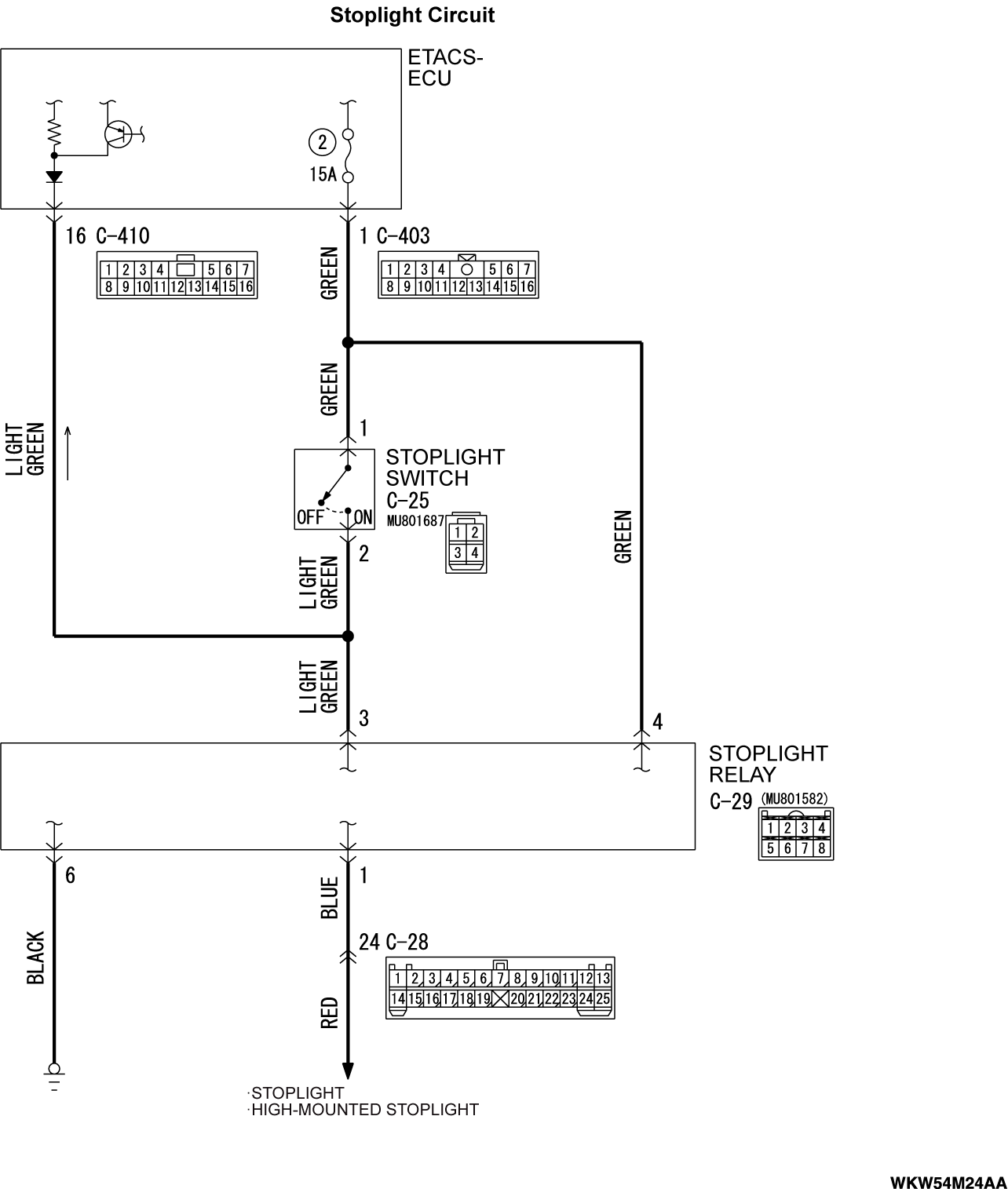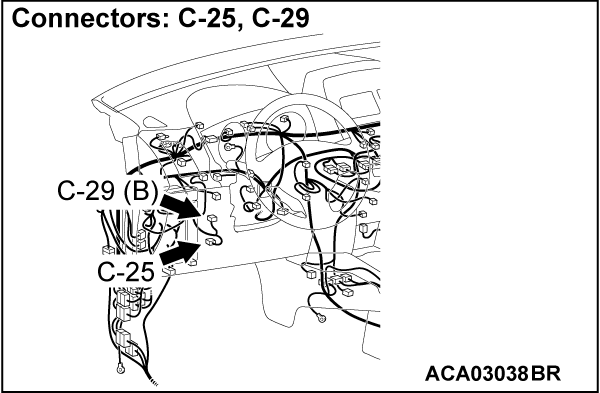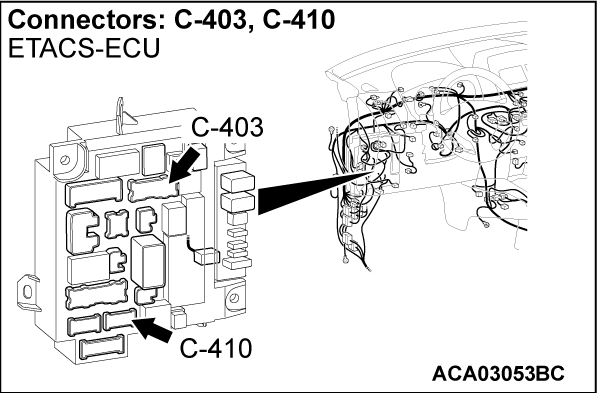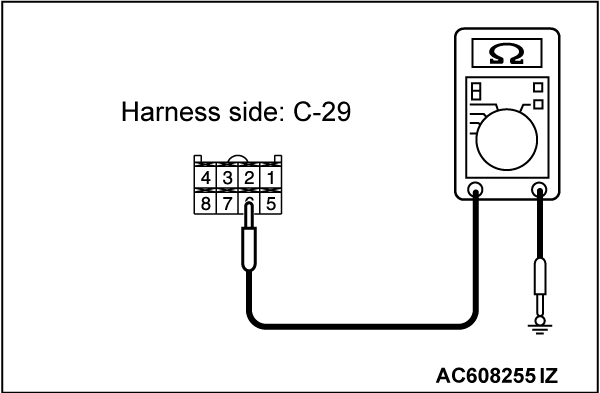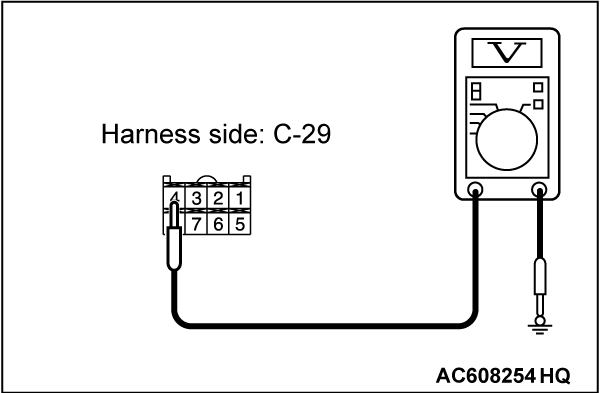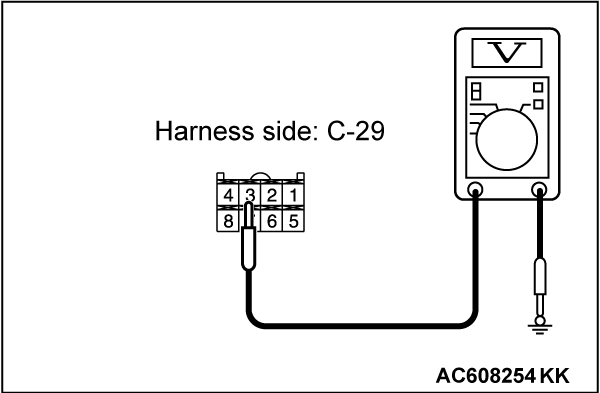Inspection Procedure 13: ETACS-ECU does not receive any signal from the stoplight switch. <Vehicles with stop light relay>
COMMENTS ON TROUBLE SYMPTOM
The stoplight switch input signal is used for the operation judgment of the functions below. If the signal is abnormal, these functions will not work.
- ASC
- Shift lock mechanism
- OSS
TROUBLESHOOTING HINTS
- The stoplight switch may be defective
- The stoplight relay* may be defective
- The ETACS-ECU may be defective
- The wiring harness or connectors may have loose, corroded, or damaged terminals, or terminals pushed back in the connector
| note | *: The stoplight relay cannot be inspected because it is a semiconductor relay. |
DIAGNOSIS
Required Special Tools:
- MB991223: Harness Set
- MB992006: Extra Fine Probe
STEP 1. Check the stoplight switch connector C-25, stoplight relay connector C-29, ETACS-ECU connectors C-403 and C-410 for loose, corroded or damaged terminals, or terminals pushed back in the connector.
Is stoplight switch connector C-25, stoplight relay connector C-29, ETACS-ECU connectors C-403 and C-410 in good condition?
STEP 2. Check the ground circuit to the stoplight relay. Measure the resistance at stoplight relay connector C-29.
(1) Disconnect stoplight relay connector C-29 and measure the resistance available at the wiring harness side of the connector.
(2) Measure the resistance value between stoplight relay connector C-29 terminal 6 and ground.
- The resistance should be 2 ohms or less.
Is the measured resistance 2 ohms or less?
STEP 3. Check the wiring harness between stoplight relay connector C-29 (terminal 6) and the ground.
- Check the ground wires for open circuit.
Is the wiring harness between stoplight relay connector C-29 (terminal 6) and the ground in good condition?
 No action is necessary and testing is complete.
No action is necessary and testing is complete. The wiring harness may be damaged or the connector(s) may have loose, corroded or damaged terminals, or terminals pushed back in the connector. Repair the wiring harness as necessary. Check that the input signal of stoplight switch is normal.
The wiring harness may be damaged or the connector(s) may have loose, corroded or damaged terminals, or terminals pushed back in the connector. Repair the wiring harness as necessary. Check that the input signal of stoplight switch is normal.STEP 4. Check the stoplight switch.
Remove the stoplight switch. Then check the continuity between the switch terminals.
 Replace the stoplight switch. Check that the input signal of stoplight switch is normal.
Replace the stoplight switch. Check that the input signal of stoplight switch is normal.
|
Is the liftgate latch switch in good condition?
 Replace the stoplight switch. Check that the input signal of stoplight switch is normal.
Replace the stoplight switch. Check that the input signal of stoplight switch is normal.STEP 5. Check the battery power supply circuit to the stoplight relay. Measure the voltage at stoplight relay connectors C-29.
(1) Disconnect stoplight relay connectors C-29 measure the voltage available at the wiring harness side of the connector.
(2) Measure the voltage between stoplight relay connector C-29 (terminal 4) and ground.
- The voltage should measure approximately 12 volts (battery positive voltage).
(3) Stoplight switch: ON
(4) Measure the voltage between stoplight relay connector C-29 (terminal 3) and ground.
- The voltage should measure approximately 12 volts (battery positive voltage).
Is the measured voltage approximately 12 volts (battery positive voltage)?
STEP 6. Check the following wiring harness.
Check the wiring harness for open and short circuit between the following connectors: No action is necessary and testing is complete.
No action is necessary and testing is complete. The wiring harness may be damaged or the connector(s) may have loose, corroded or damaged terminals, or terminals pushed back in the connector. Repair the wiring harness as necessary. Check that the input signal of stoplight switch is normal.
The wiring harness may be damaged or the connector(s) may have loose, corroded or damaged terminals, or terminals pushed back in the connector. Repair the wiring harness as necessary. Check that the input signal of stoplight switch is normal.
- Wiring harness from ETACS-ECU connector C-403 (terminal 1) to stoplight switch connector C-25 (terminal 1)
- Wiring harness from stoplight switch connector C-25 (terminal 1) to stoplight relay connector C-29 (terminal 4)
- Wiring harness from stoplight switch connector C-25 (terminal 2) to stoplight relay connector C-29 (terminal 3)
Are all the wiring harness wires in good condition?
 No action is necessary and testing is complete.
No action is necessary and testing is complete. The wiring harness may be damaged or the connector(s) may have loose, corroded or damaged terminals, or terminals pushed back in the connector. Repair the wiring harness as necessary. Check that the input signal of stoplight switch is normal.
The wiring harness may be damaged or the connector(s) may have loose, corroded or damaged terminals, or terminals pushed back in the connector. Repair the wiring harness as necessary. Check that the input signal of stoplight switch is normal.STEP 7. Measure the voltage at the ETACS-ECU connector C-410.
(1) Measure by backprobing without disconnecting the ETACS-ECU connector and stoplight switch connector.
(2) Disconnecting the stoplight relay connector C-29.
(3) Measure the voltage between the ETACS-ECU connector C-410 (terminal 16) and the body ground.
OK:
- When the brake pedal is released: Approximately 0 V - 5 V (pulse)
- When the brake pedal is depressed: Approximately system voltage
Is the check result normal?
STEP 8. Check the wiring harness between ETACS-ECU connector C-410 (terminal 16) and stoplight relay connector C-29 (terminal 3).
- Check the signal line for open circuit.
Is the check result normal?
 Replace the wiring harness.
Replace the wiring harness.STEP 9. Using scan tool MB991958, check data list.
Temporarily replace the stoplight relay, and then depress the brake pedal.
 Replace the stoplight relay.
Replace the stoplight relay. Replace the ETACS-ECU.
Replace the ETACS-ECU.
|
OK: Normal condition is displayed.
Is the check result normal?
 Replace the stoplight relay.
Replace the stoplight relay. Replace the ETACS-ECU.
Replace the ETACS-ECU.![[Previous]](../../../buttons/fprev.png)
![[Next]](../../../buttons/fnext.png)
